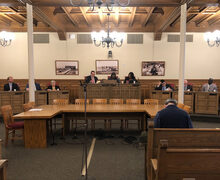Bishop Dr. H. Bernard Alex blends political realm with faith community
Surya Vaidy | Staff Photographer
Dr. H. Bernard Alex, bishop of Syracuse and leader of the Victory Temple Fellowship Church, was elected as the first Black board member for the Town of DeWitt. Alex said his work allows him to blend together faith, politics and community.
Get the latest Syracuse news delivered right to your inbox.
Subscribe to our newsletter here.
From an early age, Bishop Dr. H. Bernard Alex felt strong ties to his Syracuse community and quickly learned the power of dedication.
Growing up with seven siblings, Alex watched his father work the night shift as a janitor at the Syracuse Museum of Fine Arts, now the Everson Museum. Not knowing how to read his supervisor’s cursive handwriting, his father would wait for the museum guard to fall asleep and run home to have his wife read his assignments to him before returning to work.
His father dedicated 35 years to his work at the museum to ensure his eight children could pay for college.
“If we wanted to go to college, he was going to do what he had to do for us to get there,” Alex said. “So if we didn’t go, we couldn’t say it wasn’t because we didn’t have an opportunity.”
Now, Alex serves as the Bishop of Syracuse and pastor of the Victory Temple Fellowship Church. In 2023, he was elected DeWitt Town Board member and continues to serve as its first Black representative.
Alex said his work in the community allows him to combine his faith and political involvement throughout the Syracuse area into similar efforts.
“I see my faith to be a faith of action in a political setting, not religious,” Alex said. “(It’s a) big difference because I like religious people and I don’t like church people.”
Alex’s childhood home on South Townsend Street looked up at the hill Syracuse University stands on. He said he grew up in the projects and attended church with his family. Alex spent his childhood days reading editions of the Encyclopedia Britannica from front to back, leading to his “love of words” and decision to study English at Tuskegee University.
Laurie Kingsberry, an SU alumni and former student director of the Black Celestial Choral Ensemble at SU, worked closely with Alex as a member of the choir while they were in college. Alex attended SU for just over a year while recovering from gastrointestinal surgery.
“He came in as a leader,” Kingsberry said. “You know that some people just come in and they sort of sit and watch, but he came in immediately giving us corrections and direction … and we appreciated that.”
Kingsberry said Alex takes every opportunity to help arrange choir events and finds quality speakers to strengthen programming. He said Alex even comes in to speak to the choir when he has the chance.
Alex’s wife, Jahnjae Alex, said the two met during their high school’s music department practice. She recalled a young Alex whose commitment to civic engagement was ever-present back then.
“(His work is) exhausting and it takes a lot of time and energy, but I know it’s for the good of many others,” Jahnjae said. “He is the voice for those who don’t have a voice, either because they don’t know how to use the voice or they just don’t have the platform to speak for themselves.”
Despite holding the title of doctor, bishop and formerly, pastor, Alex said he prefers to not be addressed by them. He said his strength lies within his actions, not his title.
“They have learned to trust me,” Alex said. “If you can trust me to cook for you, if you can trust me to come to the school and help get your kids out of trouble or help you with a housing issue or whatever, then you’ll trust me in empowering you to understand this political process.”
Deputy Mayor Sharon Owens said she first met the bishop over 30 years ago, when he was her pastor, and has stayed in contact with him ever since.
“(He is a) public servant, and servitude is the foundation of faith,” Owens said. “You are here to provide for, meet the needs of and comfort others, and he is able to marry those two worlds together really efficiently.”
Growing up in an area heavily impacted by the I-81 viaduct and experiencing the hardships it created for primarily Black neighborhoods, Owens said Alex has continued to be vocal about the struggles his community continues to face.
Alex spoke at an event in December, hosted by SU’s School of Architecture, discussing the impact of rebuilding Almond Street, a neighborhood affected by I-81’s construction. During his remarks, the Bishop said that in order to fully know the Syracuse community, students need to leave the hill and learn about the area’s people and history.
Owens said Alex holds a “wealth of knowledge” and the advocacy work he does, like the Almond Street discussion, shows his commitment to educating local residents and members of the SU community. She said Alex “tells it like it is,” giving people the opportunity to receive difficult but genuine advice.
Although he serves as a bishop alongside his position on the DeWitt Town Board, Alex said he didn’t plan on ending up where he is today. He said he didn’t feel “the call” until he began taking faith-based classes in college despite growing up attending church with his family.
He didn’t act on it until he accepted a position in Syracuse as a youth pastor, however.
“Having grown up in church, I always felt the pull,” Alex said. “Some people call it the calling. I felt the pull and I didn’t want that because I saw it as restrictive.”
Alex struggled to settle on a career path as a young man. While he was interested in becoming a pastor, he didn’t want to give up his other public service efforts. As a pastor, he feared he may be barred from other community leadership positions, such as elected office.
When the opportunity to work for the church first appeared, Alex was working for the Mayor’s Office in the Office of Minority Affairs. He said he felt like something was waiting for him in church, and eventually accepted a job as a pastor.
He’s remained with the same congregation for 34 years.
“Our faith community is a community-based congregation. We are not a Sunday, only come in, go home,” Alex said. “No, we serve and meet the needs of the community in transition.”
Throughout his career, Alex has led extensive service projects, such as preparing 200 homemade meals for people in need on a weekly basis, a tradition that has run for over a decade and held strong through the COVID-19 pandemic.
Alex has also arranged numerous projects across the city, such as Syracuse Safe Surrender, in which his parish collaborated with the Onondaga County District’s Attorney Office to clear people’s minor non-criminal offenses, like traffic violations, to make entering the workforce less difficult.
“When people are in a moment in their lives, which may be a stressful time, fearful time, a confusing time, they know they can call Bishop Alex to get direction,” Owens said.
He even created a drive during the pandemic, collecting over 1,500 gallons of laundry detergent after he was approached by a woman at one of his community meals, who said she was sending her children to school in dirty clothes because she didn’t have enough money to purchase soap.
Weeks after the detergent drive, Alex was stopped on the street by a stranger. The man reached into his wallet, pulled out a $20 bill and handed it to the bishop, thanking him profusely.
Alex didn’t understand the gesture until the man told him Alex’s detergent had allowed him to wash his clothes before an important interview that grew into a job. Because of the bishop’s kindness, the man said he was able to provide for his family.
When he handed Alex the money, he told him to use it to continue helping others in the community. The interaction drove Alex to tears.
During the pandemic, Alex told his wife he was planning on marching in a protest for George Floyd as a part of the Black Lives Matter movement. While he encouraged her to join him, it was clear to Jahnjae he would’ve taken to the streets all alone if he had to.
The bishop acknowledged that others recognize him as an activist, but said he doesn’t see himself as one. Instead, he prefers to think of himself as a “community transformist.”
“It’s about transforming communities, not about activism. To me, that’s a reactionary problem. We gotta act up. We gotta activate. We gotta move,” Alex said. “It’s about transformation and that’s done through conversation, building relationships, talking to hard dogs and having the rough meetings. We are transforming and showing that we are better together.”
Published on February 20, 2025 at 1:41 am
Contact Arabella: akklonow@syr.edu





